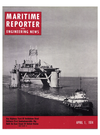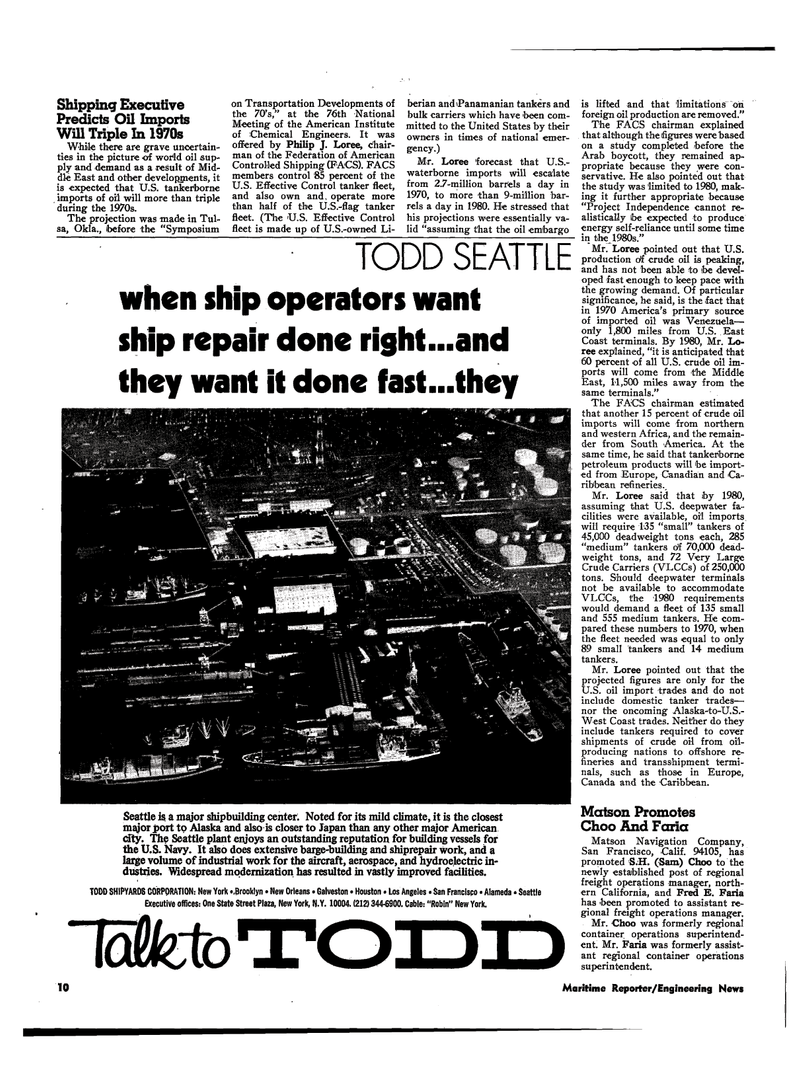
Page 8: of Maritime Reporter Magazine (April 1974)
Read this page in Pdf, Flash or Html5 edition of April 1974 Maritime Reporter Magazine
Shipping Executive
Predicts Oil Imports
Will Triple In 1970s
White there are grave uncertain- ties in the picture of world oil sup- ply and demand as a result of Mid- dle East and other developments, it is expected that U.S. tankerborne imports of oil will more than triple during the 1970s.
The projection was made in Tul- sa, Okla., before the "Symposium on Transportation Developments of the 70's," at the 76th National
Meeting of the American Institute of Chemical Engineers. It was offered by Philip J. Loree, chair- man of the Federation of American
Controlled Shipping (FACS). FACS members control 85 percent of the
U.S. Effective Control tanker fleet, and also own and. operate more than half of the U.S.-flag tanker fleet. (The -U.S. Effective Control fleet is made up of U.S.-owned Li- berian and Panamanian tankers and bulk carriers which have 'been com- mitted to the United States by their owners in times of national emer- gency.)
Mr. Loree forecast that U.S.- waterborne imports will escalate from 2.7-million barrels a day in 1970, to more than 9-million bar- rels a day in 1980. He stressed that his projections were essentially va- lid "assuming that the oil embargo is lifted and that 'limitations on foreign oil production are removed."
The FACS chairman explained that although the figures were based on a study completed before the
Arab boycott, they remained ap- propriate because they were con- servative. He also pointed out that the study was limited to 1980, mak- ing it further appropriate because "Project Independence cannot re- alistically ibe expected to produce energy self-reliance until some time in the 1980s."
Mr. Loree pointed out that U.S. production df crude oil is peaking, and has not been able to foe devel- oped fast enough to keep pace with the growing demand. Of particular significance, he said, is the fact that in 1970 America's primary source of imported oil was Venezuela— only 1,800 miles from U.S. East
Coast terminals. By 1980, Mr. Lo- ree explained, "it is anticipated that 60 per cent of all U.S. crude oil im- ports will come from the Middle
East, 1-1,500 miles away from the same terminals."
The FACS chairman estimated that another 15 percent of crude oil imports will come from northern and western Africa, and the remain- der from South America. At the same time, he said that tankerborne petroleum products will foe import- ed from Europe, Canadian and Ca- ribbean refineries.,
Mr. Loree said that by 1980, assuming that U.S. deepwater fa- cilities were available, oil imports will require 135 "small" tankers of 45,000 deadweight tons each, 285 "medium" tankers o'f 70,000 dead- weight tons, and 72 Very Large
Crude Carriers (VLCCs) of 250,000 tons. Should deepwater terminals not be available to accommodate
VLCCs, the 1980 requirements would demand a fleet of 135 small and 555 medium tankers. He com- pared these numbers to 1970, when the fleet needed was equal to only 89 small tankers and 14 medium tankers.
Mr. Loree pointed out that the projected figures are only for the
U.S. oil import trades and do not include domestic tanker trades— nor the oncoming Alaska-to-U.S.-
West Coast trades. Neither do they include tankers required to cover shipments of crude oil from oil- producing nations to offshore re- fineries and transshipment termi- nals, such as those in Europe,
Canada and the Caribbean.
Matson Promotes
Choo And Faria
Matson Navigation Company,
San Francisco, Calif. 94105, has promoted S.H. (Sam) Choo to the newly estafolished post of regional freight operations manager, north- ern California, and Fred E. Faria has foeen promoted to assistant re- gional freight operations manager.
Mr. Choo was formerly regional container operations superintend- ent. Mr. Faria was formerly assist- ant regional container operations superintendent.
TODD SEATTLE when ship operators want ship repair done right ...and they want it done fast...they
Seattle is. a major shipbuilding center. Noted for its mild climate, it is the closest major port to Alaska and also is closer to Japan than any other major American tity. The Seattle plant enjoys an outstanding reputation for building vessels for the U.S. Navy. It also does extensive barge-building and shiprepair work, and a large volume of industrial work for the aircraft, aerospace, and hydroelectric in- dustries. Widespread modernization has resulted in vastly improved facilities.
TODD SHIPYARDS CORPORATION: New York •.Brooklyn • New Orleans • Galveston • Houston • Los Angeles • San Francisco • Alameda • Seattle
Executive offices: One State Street Plaza, New York, N.Y. 10004. (212) 344-6900. Cable: "Robin" New York. 10 Maritime Reporter/Engineering News

 7
7

 9
9
